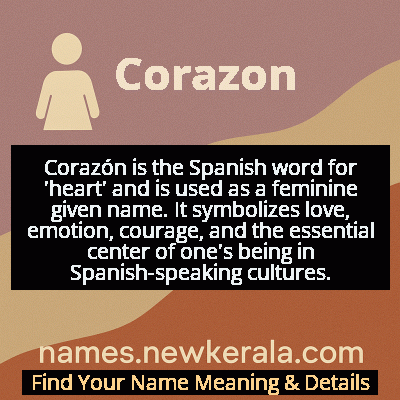Corazon Name Meaning & Details
Origin, Popularity, Numerology Analysis & Name Meaning of Corazon
Discover the origin, meaning, and cultural significance of the name CORAZON. Delve into its historical roots and explore the lasting impact it has had on communities and traditions.
Name
Corazon
Gender
Female
Origin
Spanish
Lucky Number
2
Meaning of the Name - Corazon
Corazón is the Spanish word for 'heart' and is used as a feminine given name. It symbolizes love, emotion, courage, and the essential center of one's being in Spanish-speaking cultures.
Corazon - Complete Numerology Analysis
Your Numerology Number
Based on Pythagorean Numerology System
Ruling Planet
Moon
Positive Nature
Diplomatic, friendly, artistic, empathetic.
Negative Traits
Over-sensitive, moody, indecisive, prone to self-pity.
Lucky Colours
Green, cream, white.
Lucky Days
Monday.
Lucky Stones
Pearl, moonstone.
Harmony Numbers
1, 3, 4.
Best Suited Professions
Diplomats, mediators, caregivers, artists.
What People Like About You
Cooperative spirit, friendliness, artistic talent.
Famous People Named Corazon
Corazón Aquino
Politician
First female president of the Philippines who restored democracy
Corazón de Jesús
Poet and Lyricist
Renowned Filipino poet known as 'Huseng Batute'
Corazón Amurao
Nurse
Heroic survivor who helped capture the Chicago Speck murderer
Corazón Ponce Enrile
Businesswoman
Prominent Filipino business executive and philanthropist
Name Variations & International Equivalents
Click on blue names to explore their detailed meanings. Gray names with will be available soon.
Cultural & Historical Significance
In the Philippines, the name gained additional political significance through Corazón Aquino, who became a symbol of peaceful revolution and democratic restoration. The name carries religious connotations in Catholic communities, where the Sacred Heart (Sagrado Corazón) is an important devotion, representing Jesus's love for humanity. Throughout Hispanic cultures, names referencing the heart are considered particularly meaningful, suggesting someone who is loving, courageous, and emotionally authentic. The name continues to be chosen by parents who wish to instill these values in their daughters.
Extended Personality Analysis
Individuals named Corazón are typically perceived as deeply emotional, compassionate, and nurturing. They often possess a natural warmth that draws people to them, creating strong social bonds and meaningful relationships. Their name suggests someone who leads with their heart, making decisions based on intuition and emotional intelligence rather than pure logic. This emotional depth often makes them excellent caregivers, friends, and partners who are deeply attuned to the needs of others.
Corazóns are often described as having strong moral compasses and unwavering loyalty to their loved ones. They tend to be passionate about their beliefs and causes, bringing intensity and commitment to everything they undertake. While their emotional nature can sometimes make them vulnerable to heartache, it also gives them remarkable resilience and the ability to empathize deeply with others' struggles. Their combination of strength and sensitivity often makes them natural peacemakers and healers in their communities, embodying the very essence of what it means to be 'heart-centered' in their approach to life.
Modern Usage & Popularity
In contemporary times, Corazón remains a meaningful though uncommon choice in Spanish-speaking communities, often selected for its profound emotional and cultural resonance rather than following naming trends. The name experienced a surge in popularity in the Philippines during and after Corazón Aquino's presidency in the 1980s, reflecting its political significance. While not among the most popular names in Spanish-speaking countries today, it maintains a steady presence as a classic choice that conveys deep sentiment. Modern parents who choose this name often do so to honor cultural heritage or to express values of love, courage, and emotional authenticity. The diminutive 'Cora' has gained some international popularity as a standalone name, making the full Corazón feel both traditional and distinctive. In recent years, there's been growing appreciation for meaningful Spanish names in multicultural societies, potentially increasing Corazón's cross-cultural appeal beyond traditional Spanish-speaking communities.
Symbolic & Spiritual Meanings
Symbolically, Corazón represents the universal concept of the heart as the center of human experience - encompassing love, courage, compassion, and spiritual essence. Beyond its literal meaning, the heart symbolizes emotional truth, moral courage, and the capacity for deep connection with others. In many cultures, the heart represents the balance between emotion and reason, suggesting someone who integrates feeling with wisdom. The name carries connotations of vitality and life force, as the heart is essential to physical existence. Symbolically, it also represents authenticity and being 'true-hearted' - someone who acts with genuine intention and emotional honesty. In spiritual contexts, the heart often symbolizes the soul's center and connection to divine love, making the name particularly significant in religious families. The name thus embodies multiple layers of meaning: from romantic love to courageous action, from emotional depth to spiritual connection, making it one of the most symbolically rich names in the Spanish language.

